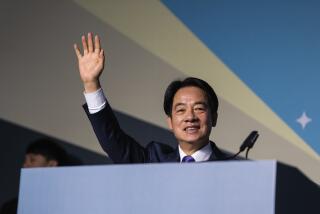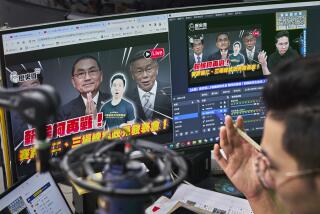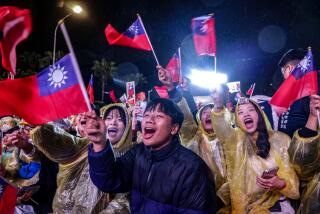Another Taiwan Politician Breaks Bread in Beijing
BEIJING — Chinese President Hu Jintao met Thursday with Taiwanese opposition leader James Soong in the latest chapter of Beijing’s “divide and conquer” strategy toward the island.
But new diplomatic language included in their joint communique -- “two sides, one China” -- suggests that the mainland may be pursuing a double-barreled approach. Even as it attempts to isolate Taiwan’s government politically, it leaves a small window for improving relations if Taiwanese President Chen Shui-bian softens his pro-independence stance.
The four words may seem inconsequential to outsiders, but Taipei and Beijing have wrangled for decades over tiny linguistic differences, with even the slightest change accorded great significance. U.S. diplomats say that on every Beijing visit, they must repeat U.S. positions on cross-strait relations to convince mainland authorities that they haven’t altered their views.
“This reading gives Chen some leeway and also gives some leeway to the Beijing side,” said Li Jiaquan, an influential Taiwan expert in Beijing. “I think they’re trying to create a peaceful, stable, win-win for both sides.”
The Taiwanese president, however, immediately denounced the talk of an initiative. “China has not compromised at all. It offered nothing new,” he said in an interview on Formosa Television.
Chen has made no secret of his displeasure that his political opponents are seizing a political opportunity while playing into Beijing’s divisive strategy. Still, analysts on both sides of the Taiwan Strait say he also craves the legacy of being the first Taiwanese president to visit Beijing. He could soften his tough line, they say, prompted in part by the need to appeal to his constituency in advance of Saturday’s National Assembly election.
At Thursday’s meeting in Beijing’s Great Hall of the People, Hu welcomed Soong’s support of eventual reunification between Taiwan and the mainland, and Soong voiced hope that the two sides could bridge their differences.
China and Taiwan split in 1949 after a civil war, but China views the island as a rightful part of its territory and has vowed to use military force if the Taiwanese declare independence.
“We must show the world that the Chinese people on either side of the Taiwan Strait have the ability and the wisdom to solve the contradictions and disagreements before us,” Hu said in comments televised live in China and Taiwan.
Soong is the third opposition candidate Beijing has invited to visit in the last six weeks as China displays its skill in playing Taiwanese politicians against one another.
During his trip, China offered a sweetener Thursday designed to appeal directly to the Taiwanese people and further pressure Chen, announcing reduced tuition and fewer regulatory impediments for Taiwanese hoping to study on the mainland.
Soong’s visit, coming on the heels of trips by Nationalist Party leader Lien Chan in late April and Nationalist Vice Chairman Chiang Pin-kung at the end of March, has put Chen on the defensive and opened divisions within his ruling Democratic Progressive Party.
“The mainland is very skillfully using the divide-and-conquer approach,” said Lo Chih-cheng, executive director of Taiwan’s Institute for National Policy Research. “They’re demonstrating much greater confidence and putting their finger right into Taiwan’s domestic politics. The terminology may be new, but I don’t think this is a new idea.”
“The ‘one China’ principle is Beijing’s bottom line,” said Guo Shuyong, an international relations expert with Shanghai Jiao Tong University. “It’s very difficult to consider other wording. Without that, we don’t even recognize that we’re all Chinese, so how can we continue to talk?”
The Bush administration has urged China to deal with the popularly elected government in Taiwan rather than limiting its attention to opposition leaders.
Skeptics said Beijing appeared to have given little ground and may have accomplished what it wanted by isolating Chen politically.
“At least China has started to look at the whole issue of negotiating with Taiwan,” said George Tsai, a research fellow with National Chengchi University in Taipei, Taiwan’s capital. “But China didn’t change its stance at all. It’s only slightly different wording.”
Most Taiwanese demand some recognition of the unique identity the nation has developed over the last five decades, even as Beijing seeks assurance that the two sides will grow closer. Ultimately, aside from the creative use of language to paper over such differences, any significant easing of tension will be hard to achieve.
“Solving this issue will require the greatest minds from over 2,000 years of human civilization,” said Shen Dingli, a foreign policy expert at Fudan University in Shanghai. “If they can figure that out, both sides win.”
*
Yin Lijin in The Times’ Beijing Bureau contributed to this report.
More to Read
Sign up for Essential California
The most important California stories and recommendations in your inbox every morning.
You may occasionally receive promotional content from the Los Angeles Times.










